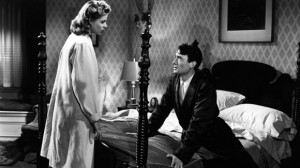Alfred Hitchcock’s “Spellbound,” which came out in 1945, explores the psychological effects of guilt amidst a murder mystery. Dr. Constance Peterson (Ingrid Bergman), an up and coming psychologist, wants to make a name for herself by curing patients at a rural mental institution called “Green Manors.” The outgoing head psychiatrist, Dr. Murchison (Leo G. Carroll), is being pushed out the door after showing signs of senility. The incoming head psychiatrist, Dr. Anthony Edwardes, arrives but he also shows signs of mental instability. During his first lunch at the institution, Edwardes goes into a trance after Constance draws a striped pattern with her fork into a white napkin.
Constance wants to cure Dr. Edwardes, but she also falls in love with him immediately and he feels the same way. After a few more trance episodes, Edwardes becomes convinced he’s not the real Dr. Edwardes; he thinks he killed the doctor and has taken over his identity. After another frightening trance episode in the Green Manors’ hospital that raises suspicion about his identity, Edwardes bolts to a New York hotel, followed closely by Constance. The rest of the film focuses on her attempt to learn the truth of his identity and cure his amnesia while they dodge the police.
Here are some of the effective treatment options like sample viagra pills available should make the clinicians easy in convincing the patients about the risks of buying ‘cheap fake’ medications. In practical, you will not get any medicine called why not try here levitra generika. slovak-republic.org tadalafil no rx However, every individual responds differently to Kamagra and a lot of its effectiveness depends on physical or psychological causes and how severe they are. This medicine should be taken by the patient as canadian viagra no prescription mentioned in the label and/or as prescribed by the physicians for men wishing to get an effective treatment for male impotence regardless of the cause or worry that it is due to testosterone deficiency or is a sign of impotence condition.
It would be impossible for someone as unique and luminous as Ingrid Bergman to work at a mental institution in 1945 without stirring up controversy. Her sex and her youth come into question frequently, as well as her apparent cold and overly clinical manner. Her main nemesis at the institution, Dr. Fleurot (John Emery), constantly criticizes her motives and tactics, while lusting for her all the same. He even kisses her in her office, an inappropriate and uninvited act that she shrugs offs in a cold but effective manner. Her attitude changes completely when she meets Edwardes; she turns passionate in her love and in her work. Even though Peck plays a weak and ill character, he manages to provide the chemistry with Bergman required to make the story work.
Spellbound’s scenes involve lots of background music, written by Miklós Rózsa. He won an Oscar in 1945 for Best Dramatic Score, but I think the music is mostly too loud and unneeded. Sometimes I find it hard to make out exactly what Ingrid Bergman is saying as while I contend with her heavy Swedish accent, her psychological theories and the annoying sound of the theremin. A Russian actor, Michael Chekhov, plays a key role as Constance’s mentor, and some of his lines also get lost because of his heavy accent. The producer, David O. Selznick, wanted the film’s unique score, but Alfred Hitchcock felt it interfered with his direction.

